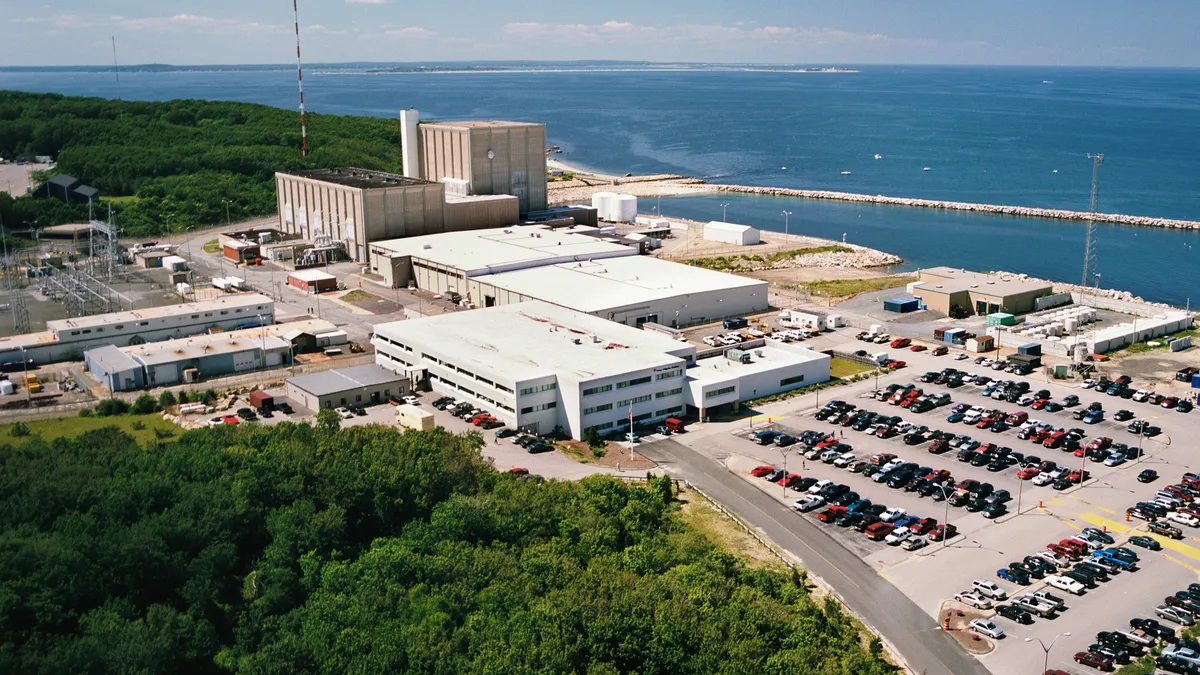Dive Brief:
- Massachusetts announced June 17 it had reached a settlement agreement with Holtec Pilgrim and Holtec Decommissioning International to dismantle and clean up the Pilgrim Nuclear Power Station in Plymouth.
-
“The collaborative effort on both sides of this agreement is something that could be used for future agreements,” Patrick O’Brien, a spokesperson with Holtec Decommissioning International told Utility Dive by email. "I wouldn’t speculate on other agreements because I am sure each plant and situation is different," he continued.
- "Massachusetts is doing the best it can in a difficult situation. The current federal regulations for the huge reactor cleanup and decommissioning process are far too weak and don’t allow for thorough state and public oversight," Geoff Fettus, a senior attorney at the Natural Resources Defense Council, told Utility Dive in an email.
Dive Insight:
The insufficient federal rules "should change and we have advocated as much before the Nuclear Regulatory Commission, Environmental Protection Agency and Congress," Fettus said.
“This agreement provides critical protections, includes compliance measures stricter than federal requirements, and secures the funds necessary to safely and properly clean up this site,” Massachusetts Attorney General Maura Healey said in a statement.
The financial agreements require Holtec to establish a $193 million trust fund during the cleanup and site restoration, a $38.4 million fund to remain in a trust until spent nuclear fuel is moved out of state, and obtain a $30 million pollution liability insurance policy.
As part of the agreement, the Commonwealth will withdraw its objections to the transfer of Pilgrim’s federal license from Entergy Nuclear Operations and Entergy Nuclear Generation Company to Holtec, filed with the Nuclear Regulatory Commission (NRC) in February 2019.
Holtec must also complete the construction of a consolidated Independent Spent Fuel Storage Installation for the interim storage of spent nuclear fuel in casks.
Massachusetts Department of Environmental Protection (MassDEP) and Department of Public Health (DPH) will oversee the process at Holtec's expense, and ensure that the company complies with state standards on cleaning up hazardous wastes, like oil and polychlorinated biphenyl. The company will also continue to provide funds to the Massachusetts Emergency Management Agency.
The agreement also requires Holtec Decommissioning International to implement a cybersecurity plan for the site, including creating an inventory of its digital assets, ensuring critical digital assets are protected by firewalls, and various access controls. In addition, Holtec Decommissioning International will roll out various measures to detect system compromises, and develop a plan for responding to cybersecurity incidents.
"Along with improved safety requirements from the NRC, bedrock [federal] environmental laws should apply [more strongly] to nuclear waste and radioactive materials," Fettus said.
If that were the case, "Massachusetts would have been in a far stronger position to protect its citizens and environment. In any event, they’ve done well playing a difficult hand."
The attorney general’s office offered no response beyond the agency statement. The NRC declined to comment on the settlement agreement. The Nuclear Energy Institute declined to speak on behalf of one of its members. No one from Greenpeace or Public Citizen was available to comment by deadline.













